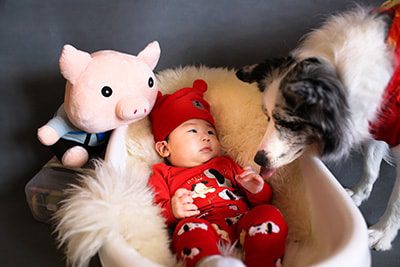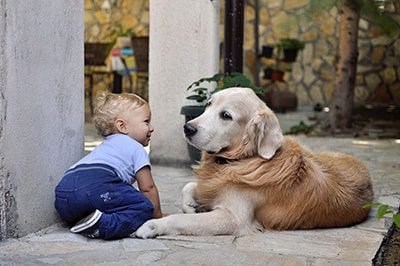Having a new member of the family is daunting enough, but owners can often have problems with the family dog when the baby arrives home.

From the dog’s point of view, it is easy to see why:
- The home routine is disrupted with owners in and out at unusual times, the normal walk may be ditched and feeding times may change.
- There is a sense of excitement and/or stress in the house.
- There seems to be a new “thing” in the house.
- This “thing” may get the dog into trouble should it try to interact with it.
- The dog may begin to feel jealous of all the interactions the “thing” is getting!
- A sound-sensitive dog may be startled by crying noises.
Some dogs quickly understand that the “thing” is a mini-human, some take time and some struggle completely to realise what a baby is.
If owners do not prepare ahead, the dog can suffer greatly: locked in the kitchen or outside, neglected, upset and punished.
So, what can be done to help?
- Remember, planning is essential.
- Relax your routine around the due date (walks, feed times, comings and goings).
- Note what happens when the dog doesn’t get its walk or arrange for someone to cover.
- Check how sensitive your dog is to babies crying. Desensitise them and link the sounds to positive stuff.
 Install baby gates if you feel more control is needed and act now at training to put your dog away. Gates are less likely to cause frustration than a door.
Install baby gates if you feel more control is needed and act now at training to put your dog away. Gates are less likely to cause frustration than a door.- Teach or top up the commands you may need, eg “out!”, “wait!”, “off!” and “leave it!”. Back these up with positive rewards-based training.
- Add new commands, eg “back up!”. This is always handy when carrying a baby around.
- Gradually decrease some affection moments.
- Let your dog become familiar with the baby equipment so that it’s not all new and scary on the baby’s homecoming day.
- Let your dog get used to the scents you will use with the baby. Link to positive things so your dog associates that scent when your baby comes home.
- If possible, get someone to bring home something that smells of the baby to give the dog prior to it coming home.
- Finally think safe, but think kind!
Of course, if you need any help prior to the baby arriving or once it is home, remember you can get help from your local professional dog behaviourist.
Thank you for reading ‘Your Dog and Your New Baby’. For more pet related articles, click here.


 Install baby gates if you feel more control is needed and act now at training to put your dog away. Gates are less likely to cause frustration than a door.
Install baby gates if you feel more control is needed and act now at training to put your dog away. Gates are less likely to cause frustration than a door.